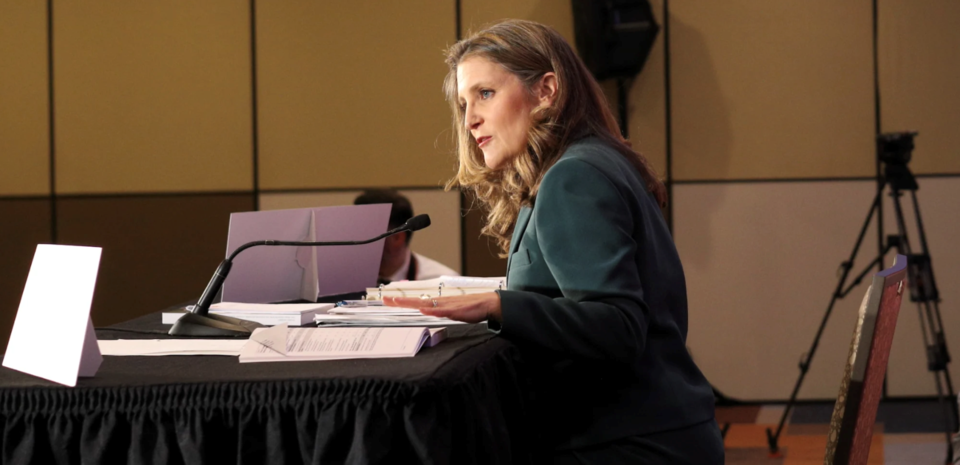The federal government is once again putting taxpayer dollars on the line to prop up the Trans Mountain pipeline expansion (TMX).
This week it came to light that the federal government approved two loan guarantees (one on March 24 and one on May 2) backing the additional $3 billion Canada’s biggest big banks recently loaned the Crown corporation.
This is a repeat of last year, when those same big banks agreed to loan Trans Mountain $10 billion to cover ballooning construction costs. The federal government greenlit a loan guarantee for the same amount — which means if Trans Mountain can’t repay the banks, Canadian taxpayers will foot the bill. So far, the public loan guarantees on the project total $13 billion.
This likely won’t be the last time we see Canada’s big banks finance TMX and the federal government backstop the banks’ loans with public dollars, said Keith Stewart, senior energy strategist at Greenpeace.
“They still don’t have enough money to finish it, even with this new money, so it will definitely happen again,” said Stewart in a written statement to Canada’s National Observer. In March, Trans Mountain reported construction of the project “is close to 80 per cent complete,” and the company expects the pipeline to be operational in the first quarter of 2024.
Finance Canada did not immediately respond to a request for comment. Finance Minister Chrystia Freeland said in February 2022 that no new public funds would flow to the project, and while this is technically true for now, if Trans Mountain is unable to repay the banks, the loan guarantees will kick in and taxpayers will be left holding the bag.
“The Ministry of Finance is engaging in semantics when they say a loan guarantee isn’t new public money,” said Stewart. “The costs have quadrupled while the amount oil companies will pay to use it is capped, so it will get sold for a multi-billion dollar loss and the public that guaranteed the loans will be on the hook.”
Even before Politico broke the news of the new $3-billion loan guarantee, Freeland was catching some heat from Bloc Québécois MP Monique Pauzé and Green Party Leader Elizabeth May on May 29 in the House of Commons during debate.
“The Prime Minister said that Trans Mountain's profits would be invested in the fight against climate change,” said Pauzé, referencing a promise made in 2019 shortly after the federal government bought the pipeline.
“That is like asking a firefighter to light a fire to justify his job.”
Pauzé demanded to know how the government is justifying TMX “now that it is clear to everyone that it will not be making any profits?”
In response, Freeland cited the importance of economic independence from the U.S.
“It is important that Canada have control over its own resources,” said Freeland. “That will not happen without Trans Mountain,” she said, adding: “We are hopeful that there will be a lot of interest on the investor side.”
So far, only Canadian banks appear willing to finance the project, and only as long as they have the assurance of a public loan guarantee.
When the federal government bought the Trans Mountain expansion project from Kinder Morgan in 2018, the estimated cost to complete the project was $7.4 billion. Today, the price tag sits at $30.9 billion. Parliamentary Budget Officer Yves Giroux told Canada’s National Observer the secret reports Finance Canada uses to claim TMX is commercially viable are based on an unrealistic 100-year lifetime for the pipeline. His previous reports have found the project is no longer a profitable investment.
May challenged Freeland’s assertion that no new public money has been spent on the project, pointing to the fact that Trans Mountain’s debt incurs $700 million in interest each year, as independent economist Robyn Allan has pointed out.
“I had no inkling that once again we are putting public money behind this climate-killing pipeline,” May told Canada’s National Observer in an emailed statement after hearing about the new loan guarantee. “This is outrageous,” she said, calling the project “a pure loser for Canada economically” and noting threats to both the Salish Sea and Indigenous rights.
During Freeland and May’s exchange on May 29, Freeland said TMX “will bring economic benefit to Canada, not the least of which will be to Indigenous Peoples.” As of March 2023, Trans Mountain Corporation “has signed agreements with 81 Indigenous communities worth over $657 million,” and the government is working “with Indigenous communities on further economic participation in Trans Mountain,” according to Finance Canada.
“TMX is like a renovation-from-hell where you end up losing the house and your marriage,” said Stewart.
NDP MP Laurel Collins did not respond to an immediate request for comment.
Conservative environment critic Gérard Deltell declined to comment.


